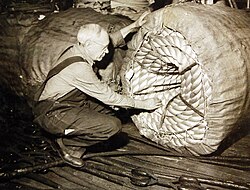Abacá
Abacá (/ɑːbəˈkɑː/ ah-bə-KAH; Filipino: [Abaka] Error: {{Lang}}: text has italic markup (help) [ɐbɐˈka]), binomial name Musa textilis, is a type of banana. It is native to the Philippines.[1] It is grown as a commercial crop in the Philippines, Ecuador, and Costa Rica. The plant, also known as Manila hemp.[1] It is very important to the economy. It is harvested for its fiber, also called Manila hemp, extracted from the leaf-stems.[2]
The plant grows to 13–22 feet (4.0–6.7 m), and averages about 12 feet (3.7 m). The fiber was originally used for making twines and ropes. It is used in a variety of paper products including tea bags, filter paper and banknotes.[3]
Abacá Media
Abacá fiber drying in abaca farm, Costa Rica
The Banton Burial Cloth (c. 1200-1400 AD), the oldest existing example of warp ikat in Southeast Asia at the National Museum of the Philippines). The cloth was found in the sacred Ipot cave of Romblon. It is made from abacá.
Abacá Fiber in Lagonoy, Camarines Sur, Philippines
Mats made from woven abacá fibers from the Philippines
A T'boli dreamweaver using a traditional loom
2. Abacá plants are harvested by “topping”, cutting the leaves with a bamboo sickle, cutting or “tumbling” the stalks. The leaves are compost on the ground, creating a fertiliser.
3. The tuxy, the outer layer of the leaf sheath contains primary fibres is separated from the inner layers.
References
- ↑ 1.0 1.1 Agricultural Research Services Botanists 1995
- ↑ "Musa textilis Née — The Plant List". www.theplantlist.org. Archived from the original on 2017-08-05. Retrieved 2021-04-22.
- ↑ "(research) Plant Molecular Biology and Plant Virology « National Institute of Molecular Biology and Biotechnology". 2013-12-03. Archived from the original on 2013-12-03. Retrieved 2021-04-22.








